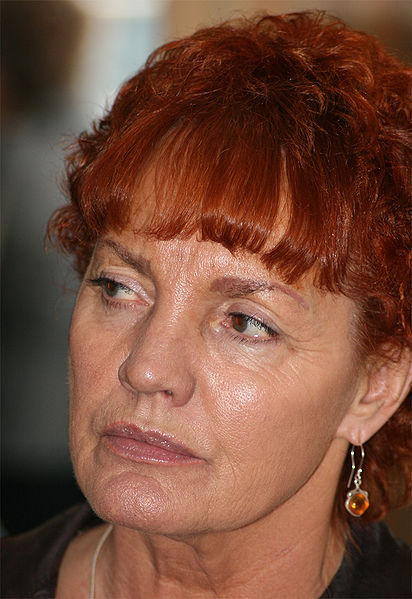
Norwegian MP Marit Nybakk condemns killing of Hazaras
Reading time: (Number of words: )
A delegation of Norwegian-Hazaras met Mrs. Marit Nybakk on October 3, 2012. The venue of the meeting was the parliament building of Norway. Mrs. Marit Nybakk is a well-known politician for the Labour Party and 3rd Vice President of the Norwegian parliament.

Meeting started with an introduction by Marit Nybakk and Ali Raza, heading the delegation, briefly described the plight of Hazaras in Afghanistan in general and Pakistan in particular. He said, “It has been now nearly 12 years, Hazaras are being killed by Lashkar-e-Jhangvi, a militant religious group in Pakistan. He referred to Human Rights Commission of Pakistan’s fact-finding Report about Baluchistan 2012 - Released August 30th, 2012, that says that Hazaras have been uprooted from Loralai, Machh and Zhob (small towns in Baluchistan province around Quetta city) and over 800 had been killed since 1999. In the democratic regime from February 2008 until May 2012 at least 550 Hazaras have been killed. Even the women and children are the victims of these terrorist attacks. Currently, the Hazara community seems to have been besieged by terror and have been put under house arrest in Quetta city, Pakistan. Giving reference to an attack on university bus carrying mostly Hazara students on June 18, 2012, he said, “… hundreds of Hazara students cannot attend colleges and universities due to fear of being targeted and killed.”
Sadique Ali, a member of the delegation, described that Lashkar-e-Jhangvi is listed in the UN 1267 Committee’s consolidated list and as a proscribed terrorist organization by the governments of the United Kingdom, the United States, Canada, New Zealand, Australia and Pakistan. Lashkar-e-Jhangvi despite being a banned militant group is very active in Pakistan to kill Hazaras. Terrorists after every killing incident telephone to the local newspaper offices and audaciously claim the responsibility for the killings. They also post the extremely graphic videos of the killings on YouTube and other social media networks to terrorize Hazara community in Quetta and all around the world. He added more that the national media blamed the provincial and federal governments for being a total failure in bringing terrorists to justice; however, Hazara community believed that the government and state establishments had deliberately disregarded Hazaras because a community with nearly half million cannot bring any major political change in the country and those involved in the killing of Hazaras had been reported as “strategic assets” of the state establishment. That’s why the killers have apparently enjoyed full impunity in killing Hazaras anywhere they like.

Zakia Ali Zade, another member of the delegation, pointed out the provincial and federal government’s failure in providing security to the Hazara community. She said either government was unable or unwilling to take measureable steps to stop the systematic-genocide of Hazaras in Pakistan as till date no perpetrator of these terrorist attacks against Hazaras had been arrested and brought to a verifiable justice. Giving reference to September and October 2011 incidents, where 48 Hazaras were taken off the bus/wagon in different incidents, were lined up and killed, while Chief Minister of Balochistan, Aslam Raisani, responding to a question from a journalist in Islamabad made fun of Hazaras by offering to send a truckload of tissue papers to the bereaving families. Another Pakistan People’s Party parliamentarian from the area — Ayatullah Durrani — suggested on a television show that the victim community benefits by getting Australian asylum. She said, “...their statements show how seriously they take the issue. In other words, this means green-signal to the terrorists.”
Mrs. Marit Nybakk expressed her grief and concerns over the current law and order situation in Quetta Pakistan. She said she would also discuss with Mr. Akhtar Chaudhry, 4th vice president of the Norwegian parliament and Mr. Svein Herberg, member of Norwegian parliament, with whom the delegation had held meetings earlier this year. She promised to have a debate in the Norwegian parliament on the issue of systematic-genocide of Hazaras in Pakistan. She also said it was important to talk to government of Pakistan over the issue through foreign ministry; moreover there is great possibility to raise the issue at United Nations.
The delegation thanked Mrs. Marit Nybakk, in sparing time for the meeting out of her busy schedule, and showing her interest in raising the issue of systematic-genocide of Hazaras, in the Norwegian parliament and United Nations.

Hazara People International Network has been established in 2010. It is working to defense Hazara people’s rights, organizing worldwide demonstrations and acting as a political arm.

Poems for the Hazara
The Anthology of 125 Internationally Recognized Poets From 68 Countries Dedicated to the Hazara
Order Now









Forum posts
6 October 2012, 20:17, by Hazara
you did great job, go on. I think it’s would be the best way to meet with parliament members in different countries of Europe.
So, describe Hazarah’s situation in Pakistan.